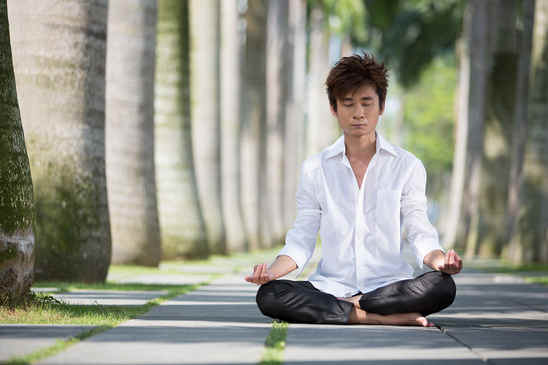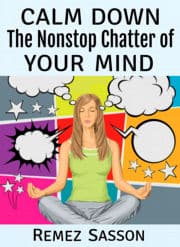
What does meditation mean? In this post, I will discuss the meaning of meditation and offer a few definitions.
People often ask:
- What is meditation, and how do you define it?
- What is meant by meditation?
- Is it worthwhile to practice it?
- What are the benefits of meditation?
- How to define meditation?
These are legitimate questions that need answers.
Browse our online courses on meditation, positive thinking, overcoming procrastination, and freedom from distractions.
Let’s start with the definition of meditation. A good understanding of a term helps us understand it better.
What Is Meditation – Meaning and Definition
How can we define meditation?
The meaning of meditation – Definition of Meditation:
- Meditation is a technique for calming down the mind’s nonstop activity and experiencing inner peace.
- It is a technique for freeing your mind from constantly nagging thoughts and worries and quieting the chatter of your mind.
- A method for relaxing the body and reducing stress and anxiety.
- It is a way that helps in going deep within and experiencing a sense of higher awareness.
- It is a way to sharpen the mind and focus.
- Meditation means reflecting and contemplating.
- It is a path to spiritual awakening and enlightenment.
Meaning of Meditation According to Various Sources
Here are a few more definitions and explanations from various sources answering the question what is meditation.
Wikipedia definition of meditation
“It is a practice where an individual uses a technique – such as mindfulness, or focusing the mind on a particular object, thought, or activity – to train attention and awareness, and achieve a mentally clear and emotionally calm and stable state.”
Merriam Webster dictionary definition of meditation
“To engage in mental exercise (such as concentration on one’s breathing or repetition of a mantra) for the purpose of reaching a heightened level of spiritual awareness.”
Cambridge dictionary definition of meditation:
“The act of giving your attention to only one thing, either as a religious activity or as a way of becoming calm and relaxed.”
Meditation definition according to Collins dictionary:
“Meditation is the act of remaining in a silent and calm state for a period of time, as part of a religious training, or so that you are more able to deal with the problems of everyday life.”
People often ask:
- Is meditating suitable only for people living a certain lifestyle?
- To practice it, do you need to live in an ashram?
- Do you need to wear certain attire or belong to a certain religion?
- Can a busy person meditate?
Below, you will find answers to these questions and a few more definitions.
What Is the Purpose and Meaning of Meditation
Here are a few clarifications about the meaning of meditation and why it’s recommended to practice it.
1. Relaxation
It is a technique for relaxing the body, calming down the restlessness of the mind, releasing stress and worries, and gaining calmness and inner happiness. Its practice leads to peace of mind and to higher awareness and understanding of yourself, your life, and the world.
2. Focused attention
This term refers to a state of focused attention and usually involves turning the attention inwards, away from the external world. In its higher form, it aims to empty the mind of thoughts and enjoy inner peace, calmness, and bliss.
3. It is an inner activity
Meditative practice is an inner activity that does not require making changes in your external life to practice it. You also do not need to follow any particular religion, be a member of a certain group, wear special clothes, or lead a particular lifestyle.
4. It is a way of life
It is more than just a technique that you may practice once or twice a day. Its effects go beyond the time you sit down to meditate and affect your whole day. Gradually, peace, happiness, clarity of vision, and thinking will become habitual.
5. Spiritual awakening
Constant practice transforms the consciousness and can lead to spiritual awakening and enlightenment.
6. Expansion of awareness
It is a way to expand your awareness beyond the ego and become aware of your Inner Self and Oneness with the Universe.
Is Meditating Suitable for Everyone?
This practice is suitable for everyone, young and old, no matter where they live and what they do.
You can live in a bustling city or a quiet village. You do not have to belong to a certain religion, and you do not need to live in an ashram.
Some people who do not know what meditation is regard it as an excuse to be lazy or run away from duties and responsibilities. They believe that it is an impracticable and useless activity.
This concept is utterly wrong and shows ignorance of this practice.
To meditate and contemplate, you need dedication, motivation, and some mental effort.
Meditating is a most valuable and rewarding activity. It sharpens your mind, expands the mind, and makes you more efficient and energetic.
Regular practice creates a state of inner peace and happiness, and removes stress, worries, and restless thinking.
You don’t need to be a monk or hermit, live in seclusion or an ashram, to meditate. You can continue living your usual life, have a job, a husband or wife, and kids, and still meditate every day.
During meditation, the mind often wanders away, and the meditator has to be constantly vigilant, bringing the attention back, over and again. This, of course, involves some effort initially, but as you gain proficiency, less effort will be necessary.
Meditation Techniques
There are many types of meditation. Some involve visualization and others the repetition of a mantra.
Some techniques require contemplating on a particular idea, and others require focusing on the act of inhaling and exhaling, the candle flame or on a specific geometric shape.
There are many other forms of meditation, such as transcendental meditation, guided meditation and mindfulness. There are also Buddhist traditions that offer a few methods.
Some techniques aim to silence the mind so you become aware of the inner self within.
All the techniques of meditation include concentration. This means focusing the attention on a single subject, thought, or activity, and not allowing it to wander away to other thoughts and emotions or anywhere else.
Don’t worry if you cannot focus and pay attention. With practice, this skill would improve.
Nowadays, this topic is becoming popular with all types of people, including people living a busy life.
Scientific researches have been done, and there is medical evidence proving that it reduces stress and has various health and mental benefits.
Some people think you need to sit on the floor with your feet crossed to meditate. Actually, this is not necessary at all. Most people would find sitting on a chair easier and more comfortable.
Useful Skills You Need
Everyone can meditate. However, a certain degree of concentration ability, self-discipline, willpower and perseverance would be most helpful.
These skills would make everything easier. You can develop these skills, and the articles and books on this website will teach you how. Even a small degree of these skills would be most helpful in your life.
What Are the Benefits of Meditation?
You might wonder what meditation’s benefits are, and whether it is worth your time and efforts.
Regular practice leads to a positive mindset and more calmness and happiness. You also gain the ability to deal calmly and effectively with problems difficulties, daily task sand daily affairs of life.
Another most important gain is the ability to slow down and eventually stop the constant, often useless, chatter of the mind.
If you could watch your mind, you would see that it always moves from one thought to another. This could, sometimes, be tiring, and it prevents you from focusing your mind. It also weakens your control over your mind and your attention.
Meditation improves your ability to control your mind, focus it, and calm it down.
When you learn to meditate, you free the mind of unnecessary distractions, unnecessary thinking, and nonstop chatter. This leads to tranquility, mental clarity, and to a sense of bliss.
A List of the Benefits of Meditating
- It makes your mind become calm.
- A practice that reduces the endless chatter of your mind.
- It improves your focus. When the mind wanders away, you learn to bring it back.
- Meditation helps you understand yourself, other people, and the world around you.
- It makes you a happier and more positive person.
- This practice reduces stress.
- Meditating helps you to become a more efficient person.
- Becoming a more tolerant and understanding person.
- Gaining clarity of mind.
- It helps you grow grow spiritually.
- Clarity of thinking, insightfulness, and an open mind.
Meditation Techniques
After understanding what is meditation, it’s time to learn how to practice it.
Where can you learn to meditate? There are meditation teachers everywhere nowadays, and there are various meditation programs, which you can find if you conduct a search.
Here is a list of a few techniques which you might like to learn about and to practice:
Practicing “Who Am I” Meditation
“Meditation is sticking to one thought. That single thought keeps away other thoughts; distraction of mind is a sign of its weakness; by constant meditation, it gains strength.”
– Sri Ramana Maharshi
“The inner experience of meditation can be had without any kind of forced discipline. The outer trappings – how one sits, breathes, dresses, and so forth – are irrelevant.”
– Deepak Chopra
You might also like reading meditation quotes.
Browse our online courses on meditation, positive thinking, overcoming procrastination, and freedom from distractions.




